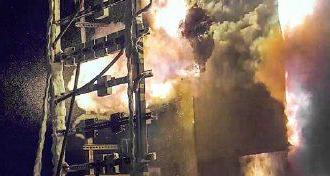
3 minute read
High-speed fire footage reveals key insights for power plant safety
A high energy arcing fault vaporising a steel panel of power plant equipment, providing data that could help keep power plants operating safely – Image: Sandia National Laboratories
Engineers from Sandia National Laboratories are using high-speed cameras and advanced algorithms, imaging and analytic methods to reveal key insights about arc flashes and help improve safety in power plants. The research is allowing the engineers to gain a deeper understanding of arc faults between two conductors, such as the high-voltage bus bars in a switchgear at a power plant.
Advertisement
High energy arcing faults are high-power electrical discharges between two or more conductors that can release tens of thousands of amps of current. They can result in explosions that reach about 35,000 degrees Celsius and vaporise steel, spewing hot metal particles into the air. Power plants evaluate risks from arc faults by knowing their zone of influence – the distance that neighbouring cables and equipment would be damaged beyond functionality.
However, precise data about a rapid arc fault is hard to collect. Bright flames and smoke obscure the view, and the high heat destroys many diagnostic instruments. The electromagnetic interference associated with the flash also impairs the ability to collect data. Sandia optical engineers have a way around those challenges. Working with Sandia fire protection engineers and colleagues at the National Institute of Standards and Technology, the group recently conducted large-scale tests to gather data for a computer model that will predict an arc fault’s zone of influence. The results could be applied to low or medium voltage cabinets at any facility.
Conductors running though these electrical cabinets were traditionally made of copper, the metal on which zones of influence have been determined over the past 50 years, but recently, many bus bar systems have used aluminium conductors or a combination of copper and aluminium. Aluminium, while less expensive and lighter than copper, is much more reactive during a high energy arc fault. This difference can affect how much energy and material an arc fault emits.
To learn about the impact of an arc fault in a full range of electrical equipment with both copper and aluminium conductors, the researchers set up high-speed and infrared cameras in a laboratory with unique electrical equipment capable of generating high energy arc fault conditions. The cameras were placed behind a cinderblock wall to get them close to the arc fault while also protecting them from the heat. They pointed the cameras toward high-grade mirrors and recorded the reflection of the explosion at more than 1,000 frames per second. The team recorded an arc fault that lasted four seconds with 26,000 amps of current. Reviewing the high-speed footage, the researchers saw how the steel panel enclosing the switchgear vaporised within half a second of the arc initiation.
Sandia’s optical engineers have developed advanced imaging and analytic methods to show several kinds of data in one video. After collecting video during a test, the group uses algorithms to stabilise and merge footage from multiple cameras. For the arc fault tests, the engineers filmed the explosion using thermal imaging so they could see through the smoke and monitor the temperature of the flames. Then, they combined that footage with a view from a high-speed camera recording visible light from the explosion. The results showed the temperature profile of the explosion relative to the physical equipment without smoke obscuring the view. These efforts allow the researchers to be able to use video as test data.
Another challenge involved accounting for bright flames and shaking cameras. Three high-speed cameras with different exposures were set up so that combining the views produced high dynamic range footage. The footage was then stabilised, and a video was produced with enough visual contrast to see where ejected particles at the edge of the explosion travelled. The researchers also used carbon tape and silica aerogel which ejected particles stuck to, providing clues to reactions that occurred during the explosion.
The researchers are hoping to use data from these tests to create a computer model that accounts for the energy, mass and momentum balances during an arc fault. Then the researchers can create a table that provides the zones of influence for a high energy arc fault of given voltages and currents in a cabinet with specific metal conductors.
For more information, visit: https://shareng.sandia.gov/news/resources/news_ releases/plant_safety/







